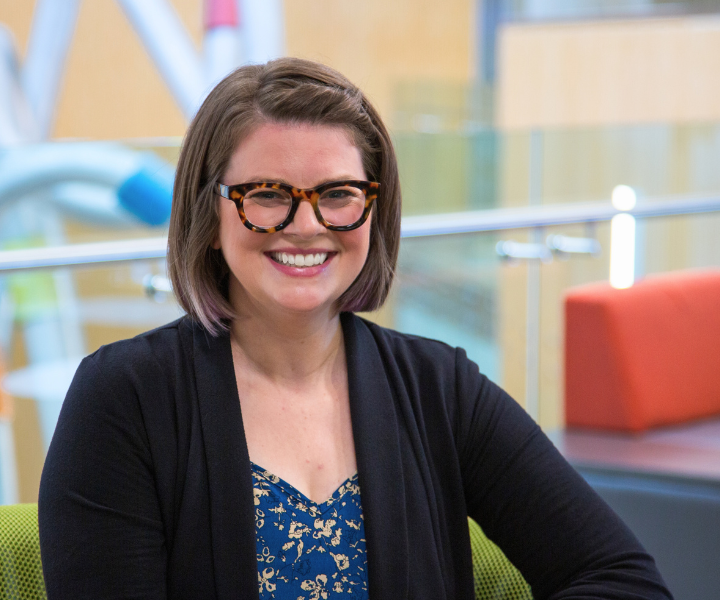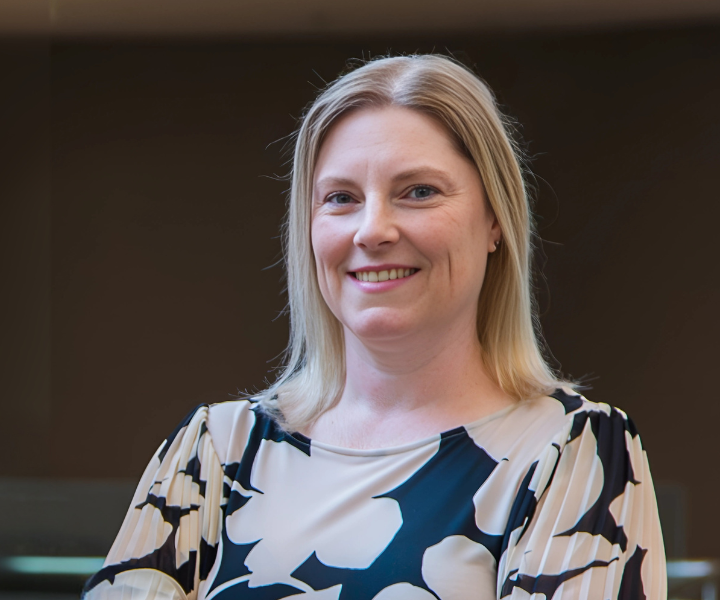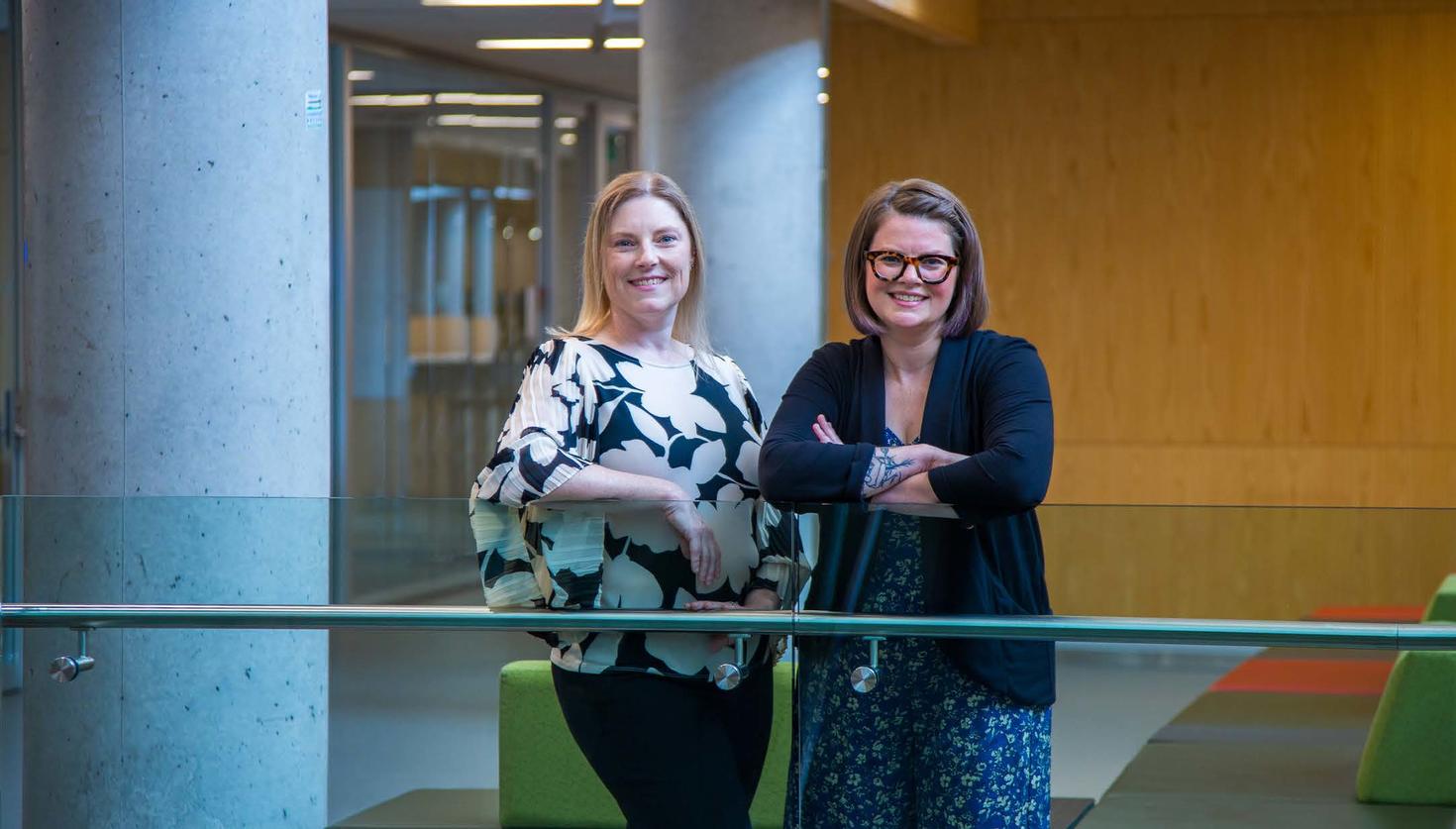From exposing systemic discrimination in the music industry to helping community organizations evaluate and improve their services, these researchers are turning data into action.
That’s why they’ve been named this year’s recipients of the Knowledge Mobilization (KMb) Excellence Award. Presented by the Office of the Vice-President, Research and Innovation, this award recognizes research that creates lasting impacts beyond academia.
Jada Watson: Turning the tables on the country music charts
Category: Early-career researcher
Jada Watson, associate professor in the School of Information Studies, is a trailblazer in the digital humanities whose work hits all the right notes. A longtime scholar of the country music industry, her research offers a sharp lens on how gender, race and sexuality shape access and opportunity in the music business. By analyzing decades of data from the Billboard charts, radio airplay and streaming platforms, Professor Watson shows that the very systems used to define success — like chart rankings and algorithms — are far from neutral.
Even though streaming platforms and radio stations often claim to be driven by “what audiences want,” Watson’s research reveals a different story. For example, she found that songs by women are often played late at night or early in the morning, when fewer people are listening.
In one study with collaborator Jan Diehm from The Pudding, she showed that back-to-back songs by women made up just 0.5% of all airplay. That means even when women are on the air, they’re rarely given the same visibility or momentum as their male counterparts. This creates a feedback loop: limited exposure leads to lower chart performance, which leads to fewer opportunities for promotion, awards and career growth.
“Like many who grew up in the 1990s, radio shaped my musical world,” says Watson. “I was lucky to hear women’s voices more often back then — their stories were the soundscape of my youth. But over the past two decades, I’ve watched their presence on country radio shrink from about 30% to less than 10%. That’s not just a programming shift — it’s a cultural loss.”

“I do this work for both sides of the radio dial — for the artists fighting to be heard, and for the young listeners (like my 11-year-old daughter) tuning in today.”
Jada Watson
— Associate professor in the School of Information Studies, Faculty of Arts
But Watson doesn’t just study the music industry — she’s changing its tune. Through her public-facing platform, SongData, she transforms complex datasets into accessible reports, infographics and blog posts that resonate with artists, journalists and policymakers alike. Her work has exposed how industry “norms” like radio programming quotas and algorithmic bias disproportionately sideline women, racialized artists and 2SLGBTQIA+ voices.
Although her research is rooted in country music, its implications extend far beyond the genre. Watson’s intersectional, data-driven approach is now being applied to other genres and platforms through collaborations with organizations like Women in Music Canada and the National Arts Centre. Projects like Share the Air are helping to reshape our understanding of Canadian commercial radio and inspire broader conversations about equity across the music industry.
Her findings have been cited in legal briefs to the U.S. Federal Communications Commission (FCC), as well as in the Grammy Recording Academy’s Report on Inclusion and Diversity. They have also been featured in major media outlets like The New York Times and Rolling Stone, and used by advocacy groups like Women in Music Canada and CMT’s Equal Play initiative.
Watson’s knowledge mobilization is multifaceted:
- Her research influenced the FCC’s 2024 decision to preserve ownership limits in commercial radio, protecting diversity in broadcasting.
- She co-created a lecture/concert, The F Word: Songs of Feminism in Country Music, with singer-songwriter Tami Neilson, blending scholarship with performance to reach new audiences.
- She currently serves on the JUNO Music Advisory Committee for Country Album of the Year and is a jury member for ADISQ
- She has trained over 150 students in data-driven, intersectional research methods, and many of them now work in music, media and academia.
Watson’s work shows how data can be a tool for justice. By making her research accessible and actionable, she equips artists, journalists and policymakers with the evidence they need to better understand and challenge inequities in the music industry.
In short, Watson is giving the industry a much-needed remix — one that centres equity, transparency and accountability. Her work reminds us that even in a genre known for tradition, there’s always room for a new verse.
Isabelle Bourgeois: Measuring what matters, where it matters most
Category: Mid-career or established researcher
Community organizations in the health and social services sectors play a vital role in improving the living conditions of vulnerable groups and advocating for their collective rights. Yet these organizations are under increasing pressure to “do more with less” in a context marked by economic, health, political and social crises. They must prove the effectiveness of their programs, justify the use of funds and keep the trust of their communities and the public — and they often lack the tools, time or training to do so.
That’s where Isabelle Bourgeois comes in.
A full professor in the Faculty of Education, Bourgeois co-leads LaboÉval — a research-intervention initiative she developed with her former PhD student, David Buetti, now an assistant professor at the Université de Montréal. Together, they empower non-profits to evaluate their programs using rigorous, data-informed methods.
Her work addresses a long-standing gap: although program evaluation has existed for over 50 years, many grassroots organizations still struggle to plan, conduct and use evaluations to improve their services, understand community needs and demonstrate impacts.

“When community organizations lead their own evaluations, they take ownership of a transformative tool and enhance their ability to drive meaningful change.”
Isabelle Bourgeois
— Full professor in the Faculty of Education
Through LaboÉval, Bourgeois and her team offer a tailored training program — covering everything from logic models and data collection to using results for decision-making.
Complemented by hands-on workshops and personalized coaching, this training allows participants to apply what they learn directly within their organizations. The approach ensures that community groups not only gain new skills but also build lasting evaluation capacity that’s grounded in their own realities.
Two community organizations that worked with LaboÉval show just how powerful this support can be:
- Naissance-Renaissance Outaouais, which helps families during pregnancy and early parenthood, used the training to better understand how their services were working. They switched from paper surveys to online ones — boosting response rates — and used the results to make smarter decisions, like postponing a service expansion that clients didn’t need.
- La Passerelle, which supports the families of people living with serious mental health challenges, used the process to improve their peer support groups. They discovered younger people weren’t attending, so they adjusted their outreach and group rules to make the space more welcoming.
In both cases, the organizations gained new tools and confidence to improve their services and better meet the needs of their communities.
Since its launch, LaboÉval has supported 16 organizations across sectors such as mental health, 2SLGBTQIA+ advocacy, family services and newcomer support. Bourgeois’s work ensures that evaluation is not a bureaucratic burden but a tool for transformation — one that helps organizations measure what they do, why it matters and how they can grow stronger.
As well as receiving the KMb Excellence Award, Bourgeois was recently named the inaugural holder of the Alex Trebek Forum for Dialogue Professorship on Public Policy. This new role was created through a collaboration between the Office of Public Policy Research and Outreach and the Alex Trebek Forum for Dialogue. It supports research that informs and influences public policy. As part of this professorship, Bourgeois will use her expertise to advance evidence-informed policymaking, working closely with government and community partners to address complex societal challenges.
